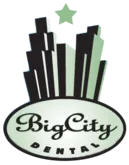Post-Op Instructions
It is important to follow instructions after you have treatment to ensure proper healing and to avoid complications. As a rule of thumb, you should always wait two hours after surgery before eating to let the anesthesia wear off. The instructions found below are guidelines. After your appointment the doctor or dental assistant will give you full instructions.
Crowns/Bridges/Veneers
Before you receive your permanent crown/bridge you will first receive a temporary restoration. This is not as sturdy as the permanent version, so you should be careful when cleaning and eating. You should brush the area gently and should not pull up on the tooth when flossing because it could become dislodged. The same goes for eating. You should avoid sticky or chewy foods while you have the temporary in.
There may be some sensitivity and irritation after the temporary or permanent is placed. This is normal and will subside after the soft tissue heals. A warm salt water rinse will help, and you can also take Advil or Tylenol if the pain does not go away.
When the permanent crown or bridge is placed it may feel a little awkward for a few days. Your mouth needs to adjust to the new tooth, and it should feel like one of your natural tooth in less than a week. If your bite feels abnormal in any way, you should let your dentist know. Caring for your bridge or crown is just like caring for your own teeth. You should brush and floss regularly.
White Fillings (Bonding)
After the anesthesia wears off your teeth will likely be sensitive. You should avoid hot and cold food or drink for the next few days. After that initial period, your treated teeth will feel as good as new. Continue your normal hygiene plan to ensure that your fillings last for a long time.
Scaling and Root Planing
Following scaling and root planning, you can expect to notice less redness, less bleeding and less swelling of your gum tissue. The health of your gum tissue can then be maintained with proper home care and regular professional care.
Discomfort or pain should be acute and should subside in a few hours or a day. Discomfort immediately after treatment is usually associated with slight throbbing or aching. This usually subsides in a few hours. Your teeth may become sensitive to temperature changes and/or sweets. This may be intense for the first few days and then diminish rapidly. Over the counter pain medications usually can remedy this problem. If you would like a prescription medication, please do not hesitate to ask. Acetaminophen or non-aspirin analgesic would be advised to keep bleeding to a minimum.
Some slight bleeding may occur during the next several brushings but this should steadily decrease after two or three days. Root surfaces of the teeth may be more exposed as the swelling of the inflamed gum tissue goes away and may result in more space between the teeth.
Diet/Eating – If extensive root planning was performed, chewing hard foods, such as meat or raw vegetables may be uncomfortable. This should last no longer than a few days. A diet of a softer consistency would be advisable until chewing becomes more comfortable. If a local anesthetic was used, avoid chewing until the feeling returns to avoid injury to the tongue or cheeks. If tooth sensitivity persists, use a desensitizing dentifrice (toothpaste) containing potassium nitrate.
If gum tissues are tender, brush your teeth gently and thoroughly. Length of time brushing your teeth is more important than pressure of the brush against your gums. By the third or fourth day, normal oral hygiene techniques can be resumed. Mouth rinsing is recommended with either of the following solutions: (1) an antimicrobial mouth rinse or (2) a warm saline rinse. Use of these rinses should be limited to one to two consecutive weeks.
Periodontal Maintenance: Periodontal maintenance scaling is needed to maintain gum and bone health. This procedure includes removal of plaque and tartar from above and below the gum line, all the way down the length of each tooth to where the root, gum, and bone meet. Rough areas of the roots are smoothed if needed, pocket depths are carefully monitored, and inflamed pockets may be irrigated with antibacterial medicines if necessary. Periodontal maintenance is considered a basic service by your insurance carrier, may be subject to a yearly deductible, and may be covered 2-4 times a year depending on your policy. PM is usually performed 3 to 4 times a year, depending on several factors: how quickly the plaque and tartar accumulate, how much bleeding or inflammation is present, how stable the present condition is, how well you are able to maintain your teeth at home on a daily basis, and any health risk factors you may have.
Extractions:
- DO NOT DISTURB THE Area: In doing so you may invite irritation, infection and/or bleeding. Be sure to chew on the opposite side for 24 hours and keep anything sharp from entering the wound (i.e. eating utensils etc.).
- DO NOT SMOKE FOR 12 HOURS: Smoking will promote bleeding and interfere with healing.
- BRUSHING: Do not brush your teeth for the first 8 hours after surgery. After, you may brush your teeth gently.
- MOUTH WASH: Avoid all rinsing for 24 hours after extraction. This is to insure the formation of a healing blood clot which is essential to proper wound healing. Disturbance of this clot can lead to increased bleeding or the loss of the blood clot. If the clot is lost, a painful condition called dry socket may occur. You may use warm salt water or mild antiseptic rinses after 24 hours only if prescribed.
- DO NOT SPIT OR SUCK THROUGH A STRAW: This will promote bleeding and may dislodge the blood clot causing a dry socket.
- BLEEDING: When you leave the office, you will be given verbal instructions regarding the control of postoperative bleeding. A rolled up gauze pad will be placed on the extraction site and you will be asked to change this dressing every 20 minutes or so depending on the amount of bleeding that is occurring. It is normal for some blood to ooze from the area of surgery. We will also give you a package of gauze to take with you to use at home if the bleeding should continue. Should you need to use the gauze at home, remember to roll it into a ball large enough to cover the wound. Hold firmly in place, by biting or with finger pressure, for about 20-30 minutes.
- PAIN: Some discomfort is normal after surgery. Analgesic tablets (i.e. Aspirin, Tylenol etc.) may be taken under your dentist's direction. Prescription medication, which may have been given to you, should also be taken as directed. If pain continues, call your dentist.
- SWELLING: To prevent swelling, apply an ice pack or a cold towel to the outside of your face in the area of the extraction during the first 12 hours. Apply alternately, 20 minutes on then 20 minutes off, for an hour or longer if necessary.
- DIET: Eat normal regular meals as soon as you are able after surgery. Cold, soft food such as ice cream or yogurt may be the most comfortable for the first day. It is also important to drink plenty of fluids.
INSTRUCTIONS FOLLOWING PERIODONTAL SURGERY
Smoking: The suction created by inhaling can cause some bleeding. Smoking will also slow healing and it might make it more painful. It is best to avoid smoking for at least the first week after surgery.
Alcohol: Alcohol affects your blood’s ability to clot and it is best to avoid alcohol for the first few days following surgery.
Surgical Dressing: If a dressing is placed, it might fall off prior to your post-operative visit. There is no need to be concerned if you are comfortable without it.
Brushing and Rinsing: Do not brush or floss the surgical area until instructed by the doctor. You can begin to brush the non-surgical areas the day of surgery. A slight amount of bleeding when you brush can be noticed for few weeks following surgery. Gentle warm salt water (1/2 teaspoon of salt in 6 oz. of water) rinsing can soothe the surgical area. If you are on a salt restricted diet, use warm water alone.
Swelling: A small amount of swelling is normal following surgery. An ice pack applied at 10 minute intervals for several hours following surgery can help prevent some of the swelling. Restricting your activities for two days can also prevent swelling. Swelling can come anytime during the first few days following surgery.
Bleeding: Some slight bleeding could occur during the first day following surgery. If it continues or seems excessive, please contact us. The best way to control unexpected bleeding from one area is to apply steady pressure with a wet tea bag or a wet paper towel for at least 15 minutes.
Discomfort: Post-surgical pain or discomfort should be expected. The pain medication prescribed should minimize your discomfort. Some relief should be noticed after the first day. If you feel no discomfort, then it is not necessary to take the medication for pain following the first two days after surgery.
Fever: It is not unusual for the body to slightly raise its temperature during the first few days of healing. If you were prescribed antibiotics, take them until the prescription runs out. If a severe allergic reaction to the medication occurs, please see the nearest hospital emergency room without delay.
Diet: Good nutrition is essential to healing. The first day restrict your diet to only a soft diet (soups, yogurt, milkshakes, oatmeal, etc.) The next few days keep to a soft food diet. If you encounter difficulty eating, use diet supplements such as Ensure or Boost. Avoid using straws for the first few days since suction created may cause some bleeding. You may notice some increased looseness of the teeth that should return to normal after the first few weeks.
If you have any questions or concerns, please do not hesitate to call the office at (773) 281-8989.

